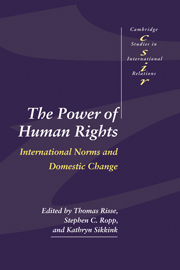Book contents
- Frontmatter
- Contents
- List of contributors
- Preface
- 1 The socialization of international human rights norms into domestic practices: introduction
- 2 Transnational activism and political change in Kenya and Uganda
- 3 The long and winding road: International norms and domestic political change in South Africa
- 4 Changing discourse: transnational advocacy networks in Tunisia and Morocco
- 5 Linking the unlinkable? International norms and nationalism in Indonesia and the Philippines
- 6 International norms and domestic politics in Chile and Guatemala
- 7 The Helsinki accords and political change in Eastern Europe
- 8 International human rights norms and domestic change: conclusions
- List of references
- Index
- Cambridge Cultural Social Studies
5 - Linking the unlinkable? International norms and nationalism in Indonesia and the Philippines
Published online by Cambridge University Press: 07 December 2009
- Frontmatter
- Contents
- List of contributors
- Preface
- 1 The socialization of international human rights norms into domestic practices: introduction
- 2 Transnational activism and political change in Kenya and Uganda
- 3 The long and winding road: International norms and domestic political change in South Africa
- 4 Changing discourse: transnational advocacy networks in Tunisia and Morocco
- 5 Linking the unlinkable? International norms and nationalism in Indonesia and the Philippines
- 6 International norms and domestic politics in Chile and Guatemala
- 7 The Helsinki accords and political change in Eastern Europe
- 8 International human rights norms and domestic change: conclusions
- List of references
- Index
- Cambridge Cultural Social Studies
Summary
Introduction
The sudden change of power in Indonesia in May 1998 makes us forget that for a very long period of time it appeared as if Southeast Asian countries were “hard cases” in terms of a positive development with regard to civil and political human rights. Except in the cases of Thailand and the Philippines, democratic freedoms were and still are being severely curtailed in the entire Southeast Asian region (Hassan 1996; Mauzy 1995). The debate over the universality of international human rights standards and Asian values has influential supporters in many Southeast Asian countries such as Malaysia, Singapore, and Indonesia (see Emmerson 1996; Heinz and Pfennig 1996; Kausikan 1994). Moreover, lacking a regional mechanism for the promotion and protection of human rights, such as the European or African Human Rights Conventions, Asian countries never experienced the socialization effects that might be expected from such a regional human rights organization (see Jones 1996).
In this context, the purpose of this chapter is twofold. First, it will evaluate the spiral model presented in the editor's introduction by comparing state-society relations in the Philippines and in Indonesia from the early 1970s to the mid-1990s. I will argue that the spiral model can be applied to the Philippines as well as to Indonesia and that in both countries, transnational human rights networks induced changes in human rights practices. The effect of these networks was more substantial in the Philippines, where according to the indicators – torture, extrajudicial killings, arbitrary arrest, and disappearances – it has led to a steady decrease in human rights violations (beginning the fifth phase of the model).
- Type
- Chapter
- Information
- The Power of Human RightsInternational Norms and Domestic Change, pp. 134 - 171Publisher: Cambridge University PressPrint publication year: 1999
- 17
- Cited by

